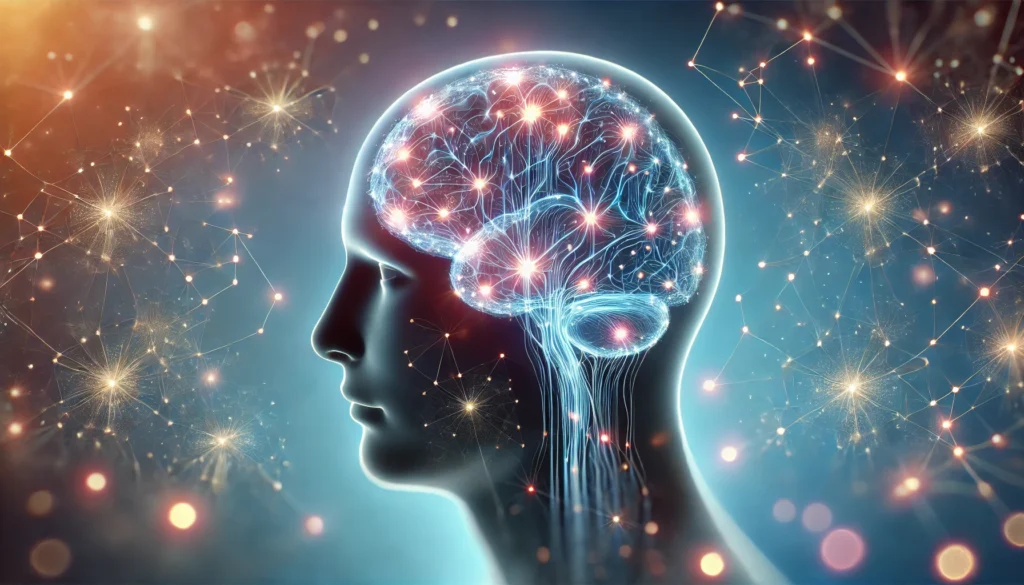Understanding Anxiety and Stress: The Need for Cognitive Support
Anxiety and stress have become pervasive concerns in modern society, affecting individuals across all demographics. While these responses are natural and necessary for survival, chronic anxiety and prolonged stress can negatively impact cognitive function, emotional stability, and overall health. The growing interest in nootropics for anxiety and nootropics for stress stems from the need for alternative solutions that enhance mental resilience without the drawbacks associated with pharmaceutical interventions. Nootropics, often referred to as “smart drugs” or cognitive enhancers, provide promising solutions for individuals seeking to manage anxiety and stress while improving overall brain function.
You may also like: The Sleep-Inducing Effects of Chicken
The Science Behind Nootropics: How They Affect the Brain
Nootropics work by modulating neurotransmitter levels, reducing oxidative stress, and enhancing neural plasticity. The mechanisms through which they operate vary widely, but they primarily target key neurotransmitters such as gamma-aminobutyric acid (GABA), serotonin, dopamine, and acetylcholine. By influencing these pathways, nootropics can help regulate mood, improve focus, and support cognitive processes that are often impaired by chronic stress.
Scientific research supports the efficacy of specific nootropics in reducing symptoms of anxiety and stress. Many of these compounds exhibit adaptogenic properties, meaning they assist the body in adapting to stressors more efficiently. Additionally, some nootropics enhance neurogenesis, the process by which new neurons form, thus promoting long-term resilience against anxiety-related disorders.

Best Nootropics for Anxiety: Effective and Evidence-Based Choices
When selecting the best nootropics for anxiety, it is crucial to consider both their scientific backing and their safety profile. The following nootropics have been extensively studied for their anxiolytic properties and their ability to support mental clarity and relaxation.
L-Theanine: The Calming Amino Acid
L-Theanine, an amino acid found in green tea, is one of the most effective nootropics for anxiety. It promotes relaxation without sedation by increasing GABA, serotonin, and dopamine levels. Studies suggest that L-Theanine significantly reduces stress-related physiological responses, such as elevated heart rate and cortisol levels. Additionally, its ability to enhance alpha brain waves leads to a state of relaxed alertness, making it an ideal choice for individuals experiencing anxiety-related cognitive impairments.
Ashwagandha: The Adaptogenic Powerhouse
Ashwagandha is an adaptogen that has been used in Ayurvedic medicine for centuries to combat stress and anxiety. Modern research supports its effectiveness, showing that it reduces cortisol levels and improves symptoms of generalized anxiety disorder (GAD). Ashwagandha works by modulating the hypothalamic-pituitary-adrenal (HPA) axis, thereby improving the body’s ability to handle stress. Regular supplementation has been associated with improved mood, reduced fatigue, and enhanced cognitive function, making it one of the best nootropics for anxiety.
Rhodiola Rosea: Enhancing Stress Resilience
Rhodiola Rosea is another powerful adaptogen known for its ability to combat stress and improve mental performance. Studies have demonstrated that Rhodiola reduces symptoms of burnout and fatigue while enhancing cognitive flexibility. It functions by regulating stress-related neurotransmitters and reducing oxidative stress in the brain. Its benefits extend beyond anxiety relief, as it also boosts energy levels and overall emotional well-being.
Bacopa Monnieri: Cognitive Support with Anxiolytic Benefits
Bacopa Monnieri is a traditional herb with strong nootropic properties. It enhances memory, cognitive function, and stress resilience. Research indicates that Bacopa Monnieri reduces symptoms of anxiety by modulating serotonin and dopamine levels. Additionally, its neuroprotective effects make it a valuable supplement for long-term cognitive health.
Best Nootropics for Stress: Supporting Mental and Physical Balance
While anxiety and stress are closely related, stress often manifests physically, leading to symptoms such as fatigue, muscle tension, and sleep disturbances. The following nootropics are particularly effective in mitigating stress and promoting overall mental balance.
Magnesium: The Essential Mineral for Stress Reduction
Magnesium plays a critical role in regulating the nervous system. It helps modulate the HPA axis and supports neurotransmitter function, reducing symptoms of chronic stress. Magnesium supplementation has been shown to decrease cortisol levels and improve sleep quality, both of which are essential for stress management.
Phosphatidylserine: The Cortisol Regulator
Phosphatidylserine is a phospholipid that plays a key role in maintaining cellular integrity in the brain. It has been extensively studied for its ability to lower cortisol levels and enhance cognitive function under stress. Athletes and high-performance professionals often use phosphatidylserine to maintain focus and resilience in demanding situations.
Omega-3 Fatty Acids: Anti-Inflammatory and Neuroprotective Benefits
Omega-3 fatty acids, found in fish oil, are well-known for their neuroprotective and anti-inflammatory properties. Research suggests that they help reduce symptoms of stress by modulating neurotransmitter activity and reducing inflammation in the brain. Omega-3 supplementation has been linked to lower rates of anxiety, improved mood stability, and enhanced cognitive performance.
The Synergy of Nootropic Stacking: Combining Supplements for Maximum Benefits
Many individuals benefit from stacking multiple nootropics to enhance their effects. For example, combining L-Theanine with caffeine provides a balanced boost in focus and relaxation without the jitters commonly associated with caffeine consumption. Similarly, Ashwagandha and Rhodiola Rosea can be used together to create a comprehensive stress-management regimen. The key to effective stacking is understanding the mechanisms of each nootropic and ensuring they complement one another without causing unwanted side effects.
Safety Considerations and Best Practices for Nootropic Use
While nootropics for anxiety and nootropics for stress are generally safe, it is essential to use them responsibly. Dosage, individual tolerance, and potential interactions with medications should always be considered. Consulting a healthcare professional before starting a new supplement regimen is advisable, particularly for individuals with pre-existing conditions.
Moreover, lifestyle factors such as diet, exercise, and sleep play a crucial role in managing anxiety and stress. Nootropics should be viewed as part of a holistic approach that includes healthy habits, mindfulness practices, and proper stress management techniques.

Frequently Asked Questions (FAQ) on Nootropics for Anxiety and Stress
1. How do nootropics for anxiety differ from conventional anti-anxiety medications?
Nootropics for anxiety differ from conventional anti-anxiety medications in several key ways, particularly in their mechanisms of action and long-term effects. While prescription drugs such as benzodiazepines work by directly enhancing GABA activity to induce sedation, nootropics for anxiety tend to have a broader, more gradual influence on neurotransmitter balance and stress adaptation. Many nootropics also exhibit neuroprotective properties, promoting long-term resilience against stress rather than simply masking symptoms. Additionally, conventional medications can come with dependency risks and withdrawal effects, whereas nootropics, when used appropriately, generally have a more favorable safety profile. Over time, nootropics may support brain plasticity, meaning they help the brain adapt and recover from stress rather than merely suppressing anxiety symptoms.
2. What are the best nootropics for anxiety that also enhance cognitive performance?
The best nootropics for anxiety that also enhance cognitive function include L-Theanine, Bacopa Monnieri, and Rhodiola Rosea. L-Theanine is particularly effective because it promotes relaxation while improving attention and focus, making it ideal for individuals who need to stay productive while managing stress. Bacopa Monnieri enhances memory and learning while also reducing anxiety through its effects on serotonin and dopamine pathways. Rhodiola Rosea is another standout because it reduces stress hormones while simultaneously increasing mental stamina and focus. Unlike conventional anti-anxiety medications, these nootropics support cognitive performance rather than causing drowsiness or impairing mental clarity. By incorporating these into a daily regimen, users can experience both anxiety relief and enhanced cognitive function without sacrificing productivity.
3. Can nootropics for stress help with social anxiety?
Yes, certain nootropics for stress can be particularly beneficial for social anxiety, as they modulate neurotransmitters that regulate social confidence and emotional stability. L-Theanine, for instance, reduces physiological stress responses, making social interactions feel less overwhelming. Ashwagandha is another effective option, as it lowers cortisol levels and enhances resilience to stressful situations, which can be particularly useful in high-pressure social environments. Additionally, Phenibut, a nootropic that acts on GABA receptors, has been used to reduce social anxiety and improve verbal fluency, though it requires careful usage due to potential tolerance buildup. By targeting the biological mechanisms underlying social anxiety, these nootropics provide natural solutions that help individuals engage in social situations more comfortably. Regular use, combined with exposure therapy and mindfulness practices, can further enhance long-term confidence in social settings.
4. How long does it take for nootropics for anxiety to work?
The time it takes for nootropics for anxiety to take effect depends on the specific compound and the individual’s biochemistry. Some nootropics, such as L-Theanine, work within 30 to 60 minutes by promoting alpha brain wave activity and reducing stress-related responses. Others, such as Bacopa Monnieri and Ashwagandha, require consistent use over several weeks to reach their full effectiveness. Adaptogens like Rhodiola Rosea can begin showing benefits within a few days, but their long-term effects on stress resilience develop gradually. Unlike prescription medications that offer immediate relief, nootropics often take time to influence brain chemistry and promote sustained changes. To maximize benefits, it is essential to maintain a consistent dosing schedule and pair nootropic use with lifestyle practices such as meditation, exercise, and proper sleep.
5. Can nootropics for stress improve sleep quality?
Yes, many nootropics for stress have secondary benefits that improve sleep quality by modulating neurotransmitter activity and reducing cortisol levels. Magnesium, for instance, is essential for relaxing the nervous system and can significantly enhance sleep onset and quality. L-Theanine promotes relaxation without sedation, which helps ease the mind into restful sleep. Adaptogens such as Ashwagandha and Rhodiola Rosea help regulate the stress response, preventing excessive cortisol production that might otherwise disrupt sleep cycles. Phosphatidylserine is another excellent nootropic for balancing stress hormones, particularly for individuals experiencing nighttime restlessness due to high cortisol levels. By incorporating these nootropics into an evening routine, individuals may experience deeper, more restorative sleep, which in turn further reduces daily stress levels.
6. Are there any side effects associated with the best nootropics for anxiety?
Most of the best nootropics for anxiety are well-tolerated, but like any supplement, they can have potential side effects depending on dosage and individual sensitivity. L-Theanine is generally safe but may cause mild dizziness or headaches in some individuals, particularly when taken in high doses. Ashwagandha may cause gastrointestinal discomfort or drowsiness, especially when first introduced. Rhodiola Rosea, while excellent for stress resilience, can sometimes cause overstimulation if taken in excessive amounts or too late in the day. Bacopa Monnieri has been known to cause digestive issues in some users due to its impact on serotonin levels. To minimize side effects, it is advisable to start with lower doses and gradually increase as needed while monitoring the body’s response.
7. Can nootropics for anxiety be taken alongside other supplements?
Yes, nootropics for anxiety can be combined with other supplements, but careful consideration is necessary to avoid potential interactions. For example, stacking L-Theanine with caffeine provides a balanced boost in focus and relaxation, but excessive caffeine intake may counteract the calming effects of L-Theanine. Combining Ashwagandha with magnesium enhances relaxation and stress resilience, making it an effective evening routine for individuals struggling with anxiety-induced sleep disturbances. However, care should be taken when combining multiple adaptogens, as they can have cumulative effects on stress hormones. Additionally, individuals taking prescription medications should consult a healthcare provider before adding nootropics to their regimen to avoid contraindications. Strategic stacking can enhance overall efficacy, but it is crucial to ensure that the selected nootropics complement one another without overstimulating or sedating the nervous system.
8. Do nootropics for stress help with burnout and mental fatigue?
Yes, nootropics for stress are particularly beneficial for individuals experiencing burnout and mental fatigue by restoring neurotransmitter balance and supporting energy metabolism. Phosphatidylserine, for example, helps lower cortisol levels and improves cognitive resilience, making it ideal for those experiencing work-related stress. Rhodiola Rosea enhances mental stamina and reduces fatigue by optimizing dopamine and serotonin activity. Omega-3 fatty acids, particularly EPA and DHA, support brain function and mitigate the cognitive decline associated with chronic stress. Many individuals also turn to Bacopa Monnieri to improve memory and mental clarity during periods of high workload. By incorporating these nootropics into daily supplementation, individuals can recover from burnout more effectively and sustain optimal cognitive performance under prolonged stress.
9. Are nootropics for anxiety safe for long-term use?
Most nootropics for anxiety are safe for long-term use when taken at appropriate doses, but individual tolerance and response should be monitored. Adaptogens like Ashwagandha and Rhodiola Rosea are traditionally used for extended periods, though cycling them periodically may enhance their effectiveness. L-Theanine is generally regarded as safe for continuous use, as it does not cause dependency or tolerance buildup. However, some nootropics, such as Phenibut, require careful regulation due to their potential for tolerance and withdrawal symptoms. Regularly assessing effectiveness, taking periodic breaks, and rotating supplements can help maintain long-term benefits without diminishing their impact.
10. How can lifestyle choices enhance the effectiveness of nootropics for stress?
Lifestyle choices play a crucial role in maximizing the benefits of nootropics for stress. Proper nutrition, particularly a diet rich in essential fatty acids, amino acids, and antioxidants, provides the foundation for optimal brain function. Regular exercise enhances endorphin release and reduces cortisol levels, complementing the stress-reducing effects of nootropics. Sleep hygiene is equally important, as nootropics work best when the brain is well-rested. Mindfulness practices such as meditation and deep breathing exercises further enhance the anxiolytic effects of nootropics by promoting parasympathetic nervous system activation. Combining nootropics with healthy lifestyle habits creates a synergistic effect that leads to lasting stress resilience and mental well-being.

Conclusion: Harnessing the Power of Nootropics for a Calmer Mind
The search for the best nootropics for anxiety and stress has led to the discovery of numerous effective solutions that support mental well-being. From adaptogens like Ashwagandha and Rhodiola Rosea to neurotransmitter-modulating compounds like L-Theanine and magnesium, the options available provide significant benefits without the drawbacks of conventional medications. By understanding the science behind nootropics and using them strategically, individuals can cultivate a sense of calm, enhance cognitive function, and build resilience against life’s daily stressors. As research continues to evolve, the future of nootropic supplementation holds even greater promise for those seeking natural, evidence-based approaches to mental wellness.
Further Reading:
Top 7 Nootropic Adaptogens to Conquer Anxiety and Stress
The No BS Guide to Adaptogens for Hormonal Balance and Stress
natural anxiety remedies, cognitive enhancers for stress, brain-boosting supplements, adaptogens for mental health, herbal stress relief, neurotransmitter support, smart drugs for relaxation, nootropic stacks for calmness, mood-enhancing supplements, best herbal supplements for anxiety, stress management supplements, mental clarity enhancers, focus and relaxation nootropics, brain health optimization, cognitive wellness solutions, natural calming agents, anxiety-reducing herbs, relaxation-promoting compounds, holistic mental wellness, mind-balancing nootropics
.Important Note: The information contained in this article is for general informational purposes only, and should not be construed as health or medical advice, nor is it intended to diagnose, prevent, treat, or cure any disease or health condition. Before embarking on any diet, fitness regimen, or program of nutritional supplementation, it is advisable to consult your healthcare professional in order to determine its safety and probable efficacy in terms of your individual state of health.
Regarding Nutritional Supplements Or Other Non-Prescription Health Products: If any nutritional supplements or other non-prescription health products are mentioned in the foregoing article, any claims or statements made about them have not been evaluated by the U.S. Food and Drug Administration, and such nutritional supplements or other health products are not intended to diagnose, treat, cure, or prevent any disease.


